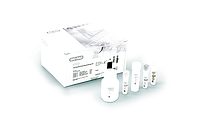Bio-Rad Laboratories, Inc. has announced that the AOAC INTERNATIONAL validated its iQ-Check® Salmonella II Real-Time PCR Kit as a First Action Official Method of Analysis (OMA method number 2017.06) for the detection of Salmonella spp in raw meat in as little as 12 hours and as little as 20 hours for all other samples, including food and environmental surfaces.
The Official Methods of Analysis (OMA) program is AOAC INTERNATIONAL’s premier program for evaluating analytical methods in chemistry, microbiology, and molecular biology. Methods undergo rigorous scientific scrutiny, and only those demonstrating the highest level of confidence are granted Official Method approval.
To earn this designation, Bio-Rad conducted a collaborative study evaluating the reproducibility and performance of the iQ-Check Salmonella II Real-Time PCR Kit. Dry pet food and milk chocolate were selected for evaluation, as they are especially challenging matrices due to the large presence of inhibitory compounds.
This AOAC validation approves the iQ-Check Salmonella II Real-Time PCR Kit for a variety of food and environmental surfaces, including: 375 g test portions of raw ground chicken, ready-to-eat deli ham, dry dog food, wet cat food, milk chocolate, raw milk cheese, 30 mL chicken carcass rinse, 25 g test portions of whole eggs, raw ground beef, raw ground chicken, cantaloupe, peanut butter, raw chicken breast, raw pork, and fresh spinach. Validated surfaces include stainless steel, ceramic, plastic, and sealed concrete.
The iQ-Check Salmonella II PCR Detection Kit is based on the fast, sensitive, and proven technology of real-time PCR. Due to the sensitivity and specificity of PCR, results can be obtained in as little as 12 hours for raw meat samples and in 20 hours for all other samples (including food and environmental samples) following a single enrichment in a nonselective medium.
The iQ-Check Free DNA Removal Solution protocol is also included under the scope of the AOAC validation. This method provides an ideal way to remove free DNA from food and environmental samples prior to PCR analysis without the need for hazardous reagents such as ethidium or propidium monoazde.



